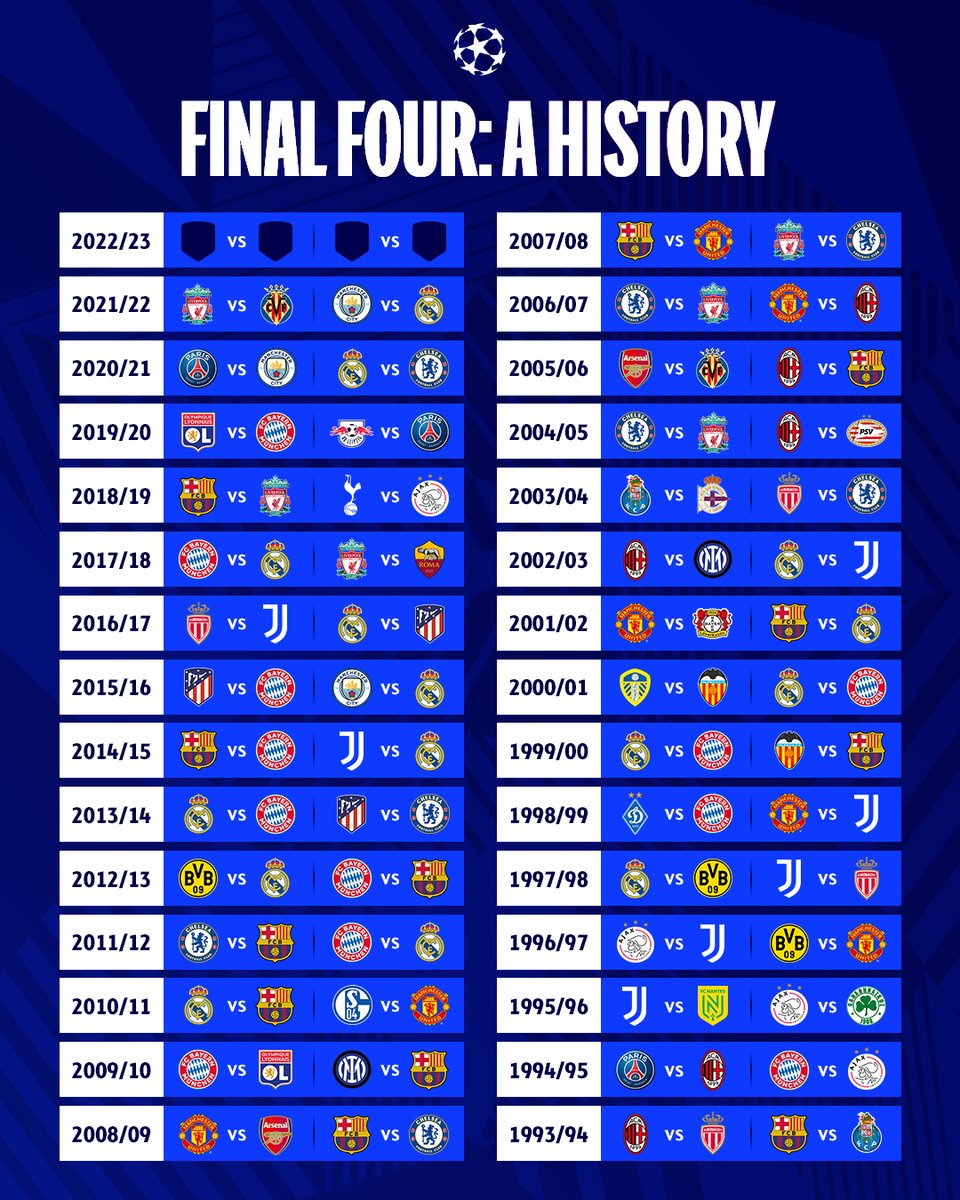
The Immortal Roll Call: A Journey Through UEFA Champions League Past Champions
The UEFA Champions League, with its iconic anthem and star-ball logo, stands as the pinnacle of European club football. It is a competition steeped in history, drama, and unparalleled glory, where legends are forged and dreams are realized. From its humble beginnings as the European Champion Clubs’ Cup in 1955 to the global spectacle it is today, the tournament has witnessed a glittering array of champions, each etching their name into the annals of football history. This article delves into the illustrious list of past winners, tracing the evolution of the competition, celebrating the dynasties that defined eras, and acknowledging the unforgettable moments that have shaped its legendary status.
The Genesis: Real Madrid’s Unprecedented Dominance (1950s – Early 1960s)
The story of the European Cup begins with an era of unparalleled dominance by one club: Real Madrid. Inspired by the French sports newspaper L’Équipe, the competition was conceived as a continental club championship. The inaugural final in 1956 saw Real Madrid defeat Stade de Reims, setting the stage for a dynasty that would likely never be replicated. Led by the legendary Alfredo Di Stéfano, Francisco Gento, and Ferenc Puskás, Real Madrid won the first five editions of the tournament consecutively, from 1956 to 1960. Their fluid, attacking football captivated audiences and established the competition’s prestige from the outset. This “Los Blancos” side laid down a marker of excellence, creating a legacy that continues to inspire.
After Real Madrid’s initial reign, other giants began to emerge. Benfica, with the electrifying Eusébio, broke Real’s stranglehold, winning back-to-back titles in 1961 and 1962, defeating Barcelona and Real Madrid in the respective finals. Italian clubs then asserted their presence, with AC Milan claiming their first title in 1963, followed by Helenio Herrera’s “Grande Inter,” who showcased their formidable catenaccio style to win in 1964 and 1965. Real Madrid, however, proved their enduring quality by securing their sixth title in 1966, an era-defining achievement that underscored their status as Europe’s original kings. The decade concluded with Celtic’s historic triumph in 1967, becoming the first British team to lift the trophy with their “Lisbon Lions,” and Manchester United’s emotional victory in 1968, a tribute to the Busby Babes, cementing the competition’s growing reach and appeal.
The Rise of New Powers and English Hegemony (1970s – 1980s)
The 1970s ushered in a new era, characterized by tactical innovation and the rise of formidable new powers. Ajax, spearheaded by the revolutionary Johan Cruyff and Rinus Michels’ “Total Football,” dominated the early 70s, winning three consecutive titles from 1971 to 1973. Their fluid, interchangeable play revolutionized the game and left an indelible mark. Following Ajax, Bayern Munich, led by the incomparable Franz Beckenbauer and prolific striker Gerd Müller, emulated their feat, securing a hat-trick of titles from 1974 to 1976. This period firmly established the Bundesliga’s power on the European stage.
The latter half of the 1970s and much of the 1980s witnessed a remarkable period of English dominance. Liverpool, under the astute management of Bob Paisley and Joe Fagan, established themselves as a European powerhouse, winning four titles between 1977 and 1984. Their success was built on a blend of tactical discipline, powerful attacking play, and an unwavering team spirit. Perhaps the most romantic story of this era was Nottingham Forest, managed by the charismatic Brian Clough, who incredibly won the trophy twice in successive seasons (1979 and 1980), a truly astonishing feat for a relatively smaller club. Aston Villa added another English triumph in 1982.
However, the 1980s also brought a more diverse set of winners, signaling a broader distribution of power across the continent. Hamburg (1983), Steaua București (1986), FC Porto (1987), and PSV Eindhoven (1988) each celebrated their maiden European Cup triumphs, showcasing the growing strength of leagues beyond the traditional powerhouses. Steaua’s victory, in particular, was monumental, being the first and only triumph for a Romanian club. The decade ended with AC Milan’s resurgence under Arrigo Sacchi, featuring the Dutch trio of Ruud Gullit, Marco van Basten, and Frank Rijkaard, who won back-to-back titles in 1989 and 1990, ushering in a new age of tactical sophistication and attacking prowess.
The Champions League Era: Rebranding and Modern Giants (1990s – Early 2000s)
The 1992-93 season marked a significant turning point with the rebranding of the European Cup into the UEFA Champions League. This transformation introduced a group stage format, increased commercialization, and the iconic anthem that has become synonymous with elite football. The first team to lift the newly rebranded trophy was Olympique Marseille in 1993, though their victory was later marred by scandal.
The 1990s and early 2000s saw a mix of established giants reasserting themselves and new forces emerging. AC Milan continued their strong run, appearing in multiple finals and winning in 1994 with a memorable demolition of Barcelona. Ajax, with a young, exciting squad including Edwin van der Sar, Clarence Seedorf, and Patrick Kluivert, recaptured their glory in 1995. Juventus, led by Marcello Lippi, won in 1996, while Borussia Dortmund provided a memorable upset in 1997, defeating the mighty Juventus.
Real Madrid, after a 32-year drought, finally reclaimed their crown in 1998, ushering in their “Galácticos” era and winning three Champions League titles in five seasons (1998, 2000, 2002), a testament to their enduring pursuit of European supremacy. Manchester United, under Sir Alex Ferguson, achieved a historic treble in 1999, securing the Champions League in a dramatic final against Bayern Munich. The early 2000s also saw FC Porto, managed by a young José Mourinho, achieve an unlikely triumph in 2004, a testament to tactical brilliance and collective effort.
The Contemporary Era: Tactical Evolution and Super Club Dominance (Mid-2000s – Present)
The mid-2000s onwards has been defined by the tactical evolution of the game, the increasing financial power of a select few “super clubs,” and the emergence of generational talents. Liverpool delivered one of the most incredible comebacks in final history in 2005, overcoming AC Milan from 3-0 down. AC Milan, however, got their revenge in 2007.
The latter half of the 2000s and the 2010s were largely dominated by Spanish giants Barcelona and Real Madrid. Pep Guardiola’s Barcelona, with their revolutionary tiki-taka style and the unparalleled genius of Lionel Messi, captivated the football world, winning titles in 2006, 2009, 2011, and 2015. Their brand of football set new benchmarks for possession-based, attacking play.
Not to be outdone, Real Madrid embarked on an unprecedented run of success under Zinedine Zidane, winning three consecutive titles from 2016 to 2018, adding to their “La Décima” in 2014. This period saw them become the first club in the Champions League era to successfully defend their title, and then defend it again, showcasing a remarkable blend of star power, tactical flexibility, and big-game mentality.
Other notable winners in this period include Inter Milan (2010) under José Mourinho, Chelsea (2012, 2021) with two unexpected yet well-deserved triumphs, and Bayern Munich (2013, 2020) who consistently remained at the summit of European football. Liverpool, under Jürgen Klopp, reaffirmed their status as a European elite, winning in 2019 and reaching multiple finals. Manchester City finally broke their duck in 2023, completing their own treble under Pep Guardiola, signifying the culmination of years of investment and strategic planning.
The Immortal Roll Call: A Summary of Champions
As of the 2023 final, the list of UEFA Champions League/European Cup winners reads as follows:
- Real Madrid: 14 titles (1956, 1957, 1958, 1959, 1960, 1966, 1998, 2000, 2002, 2014, 2016, 2017, 2018, 2022)
- AC Milan: 7 titles (1963, 1969, 1989, 1990, 1994, 2003, 2007)
- Bayern Munich: 6 titles (1974, 1975, 1976, 2001, 2013, 2020)
- Liverpool: 6 titles (1977, 1978, 1981, 1984, 2005, 2019)
- Barcelona: 5 titles (1992, 2006, 2009, 2011, 2015)
- Ajax: 4 titles (1971, 1972, 1973, 1995)
- Manchester United: 3 titles (1968, 1999, 2008)
- Inter Milan: 3 titles (1964, 1965, 2010)
- Chelsea: 2 titles (2012, 2021)
- Benfica: 2 titles (1961, 1962)
- Nottingham Forest: 2 titles (1979, 1980)
- Juventus: 2 titles (1985, 1996)
- FC Porto: 2 titles (1987, 2004)
- Borussia Dortmund: 1 title (1997)
- Celtic: 1 title (1967)
- Hamburg: 1 title (1983)
- Steaua București: 1 title (1986)
- PSV Eindhoven: 1 title (1988)
- Red Star Belgrade: 1 title (1991)
- Olympique Marseille: 1 title (1993)
- Feyenoord: 1 title (1970)
- Aston Villa: 1 title (1982)
- Manchester City: 1 title (2023)
Conclusion: A Legacy of Greatness
The UEFA Champions League, and its predecessor the European Cup, has been a stage for the greatest clubs, players, and managers to showcase their talent and ambition. From Real Madrid’s foundational dominance to the modern tactical battles of the super clubs, each champion has contributed to the rich tapestry of this magnificent competition. The list of winners is not merely a record of triumphs, but a living testament to the evolution of football itself – from the amateurish charm of its early days to the globalized, high-stakes spectacle it has become.
The Champions League remains the ultimate benchmark for club excellence, a tournament where only the strongest, most resilient, and often most fortunate teams can emerge victorious. As new seasons dawn, clubs across Europe will once again embark on the arduous journey, dreaming of adding their name to this exclusive and immortal roll call, forever chasing the glory of being crowned the champions of Europe. The legacy continues, and the anticipation for the next chapter in this grand saga is eternal.



